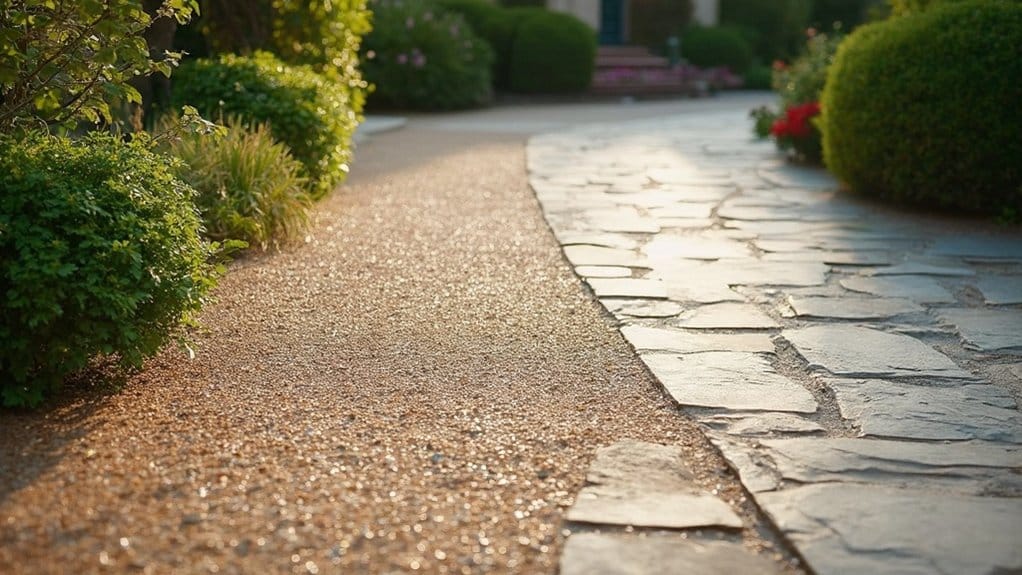Comparing resin-bound gravel and traditional paving comes down to three key factors: fitting, longevity and upkeep. Resin-bound surfaces can be laid rather quickly and typically last 20-30 years with minimal fuss. Traditional paving, whilst tried and tested, often needs more graft during installation and regular maintenance to keep it ship-shape.
Resin-bound driveways and paths handle British weather brilliantly, with excellent drainage that prevents those annoying puddles we're all too familiar with. The finish looks smart and modern – perfect for contemporary homes. Traditional paving, like block paving or concrete slabs, offers that classic kerb appeal many UK homeowners favour.
Both options impact the environment differently and vary in cost. Think of resin as a premium option that pays off over time, whilst traditional paving represents the conventional choice with predictable costs.
Key Takeaways
Resin-bound driveways offer exceptional value compared to traditional paving:
- With a 20-30 year lifespan versus traditional paving's 15-20 years, resin-bound surfaces prove far more durable – think of it lasting through your children's entire school years.
- Excellent drainage means no more puddles after British downpours, and it's fully compliant with UK drainage regulations. Traditional paving often needs extra drainage systems fitted.
- Upkeep is a doddle – just sweep regularly and give it an occasional blast with the pressure washer. Traditional paving demands more elbow grease with weeding and repairs.
- Style-wise, resin-bound gravel brings modern kerb appeal with loads of colour choices, whilst traditional paving sticks to classic but limited designs.
- Yes, you'll pay more upfront for resin-bound, but you'll save a packet long-term with minimal maintenance and fewer replacements needed than traditional paving.
Installation Process Comparison
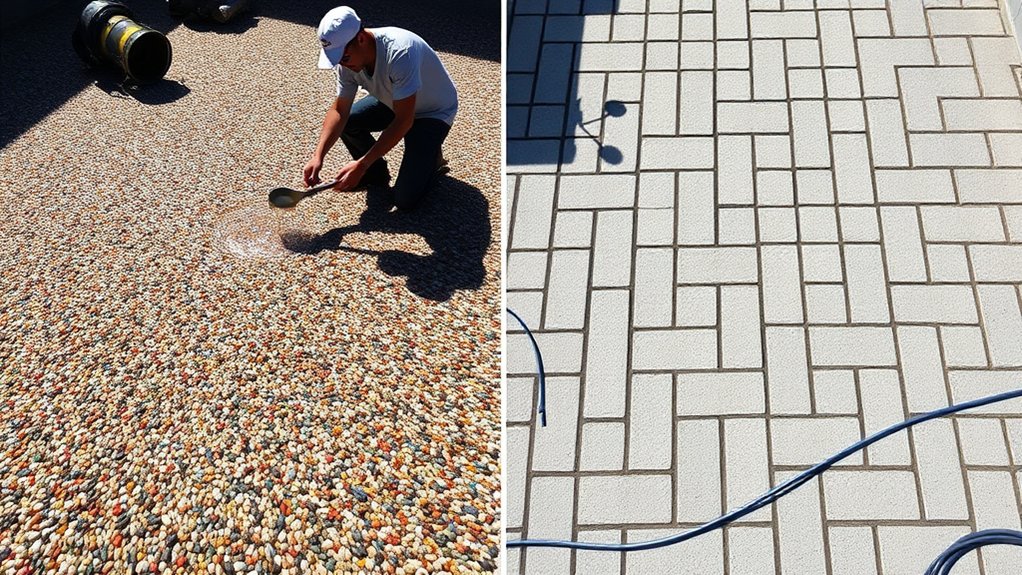
Comparing resin-bound gravel and traditional paving installations, both need proper expertise to get right.
Resin-bound systems require careful mixing of resin and aggregate, and you've got to work quickly – the mixture starts setting within 10-30 minutes. Think of it like mixing cement: once it starts going off, there's no going back. The quality of materials used significantly impacts the final outcome of the resin bound gravel surface. Additionally, the optimal weather conditions for installation are critical to ensure proper adhesion and curing.
Traditional block paving takes longer but offers more flexibility with timing.
Both need a solid base, but resin-bound surfaces often need extra prep work, including priming or mesh reinforcement. It's rather like painting a wall – skip the primer, and you'll regret it later.
Your choice boils down to what suits your project best. Resin-bound needs swift, precise work but gives a smooth finish.
Traditional paving takes longer but is more forgiving during installation. Best to weigh up your timeline and budget against the skills of your chosen installers.
Durability and Longevity
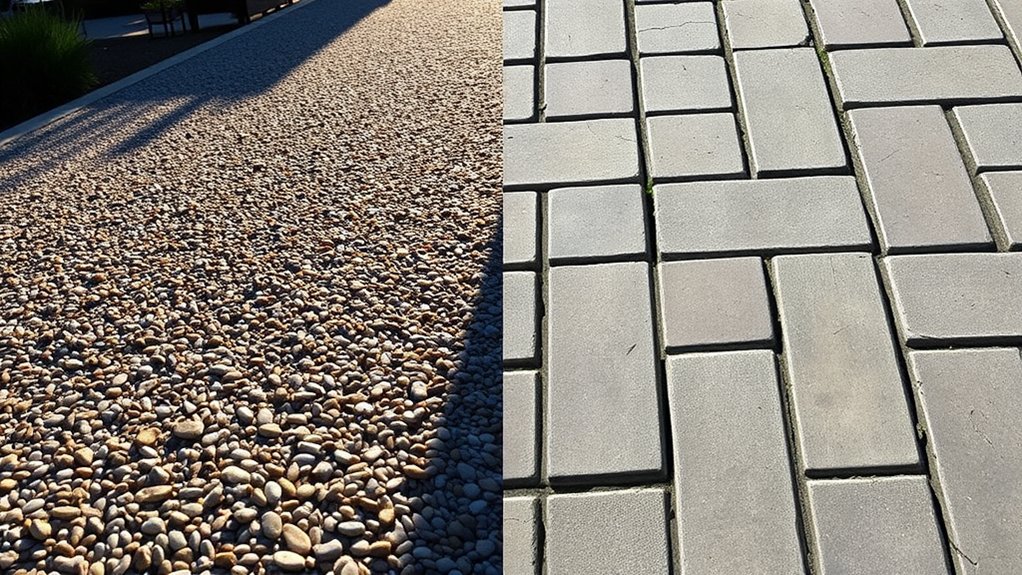
Resin-bound gravel typically outlasts traditional paving options, with a lifespan of 20-30 years compared to asphalt's 15-20 years.
Think of it like a good pair of walking boots – the quality of materials and proper fitting make all the difference. When installed correctly, resin-bound surfaces handle British weather brilliantly, from scorching summer days to winter freezes. The longevity of resin-bound paving is influenced by material quality and installation techniques, ensuring a durable and long-lasting surface. Additionally, professional installation is crucial to prevent early failure, enhancing the overall durability of the surface.
The permeable nature of resin-bound gravel means it copes well with our notorious UK rainfall, allowing water to drain naturally rather than forming puddles. This drainage helps prevent common issues like ice damage in winter.
Unlike traditional paving, which often cracks and splits over time, resin-bound surfaces maintain their integrity when properly laid.
The key to maximising longevity lies in choosing quality resin and ensuring professional installation.
Whilst the initial cost might be higher than traditional paving, the extended lifespan and reduced maintenance needs make it a savvy long-term investment for UK property owners.
Maintenance Requirements
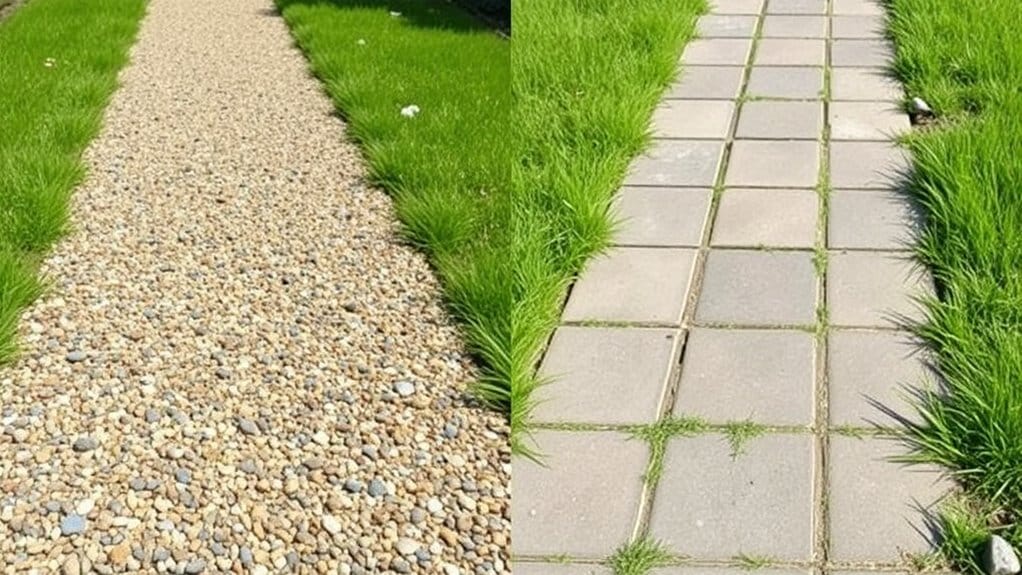
Resin-bound gravel and traditional paving both need upkeep, but in quite different ways.
Resin-bound surfaces simply need regular sweeping and occasional cleaning with a jet wash on a wide spray setting. A bit of washing-up liquid usually does the trick, though you might need specialist cleaners for tough marks. To maintain porosity and permeability, it's recommended to perform annual maintenance to prevent issues such as weed and algae growth, as regular inspections help identify potential problems early on.
Traditional paving is rather more demanding. You'll find yourself reaching for the pressure washer more often and spending time pulling weeds, particularly with block paving where they love to sprout between the joints.
Think of it like this: whilst resin-bound needs a quick sweep and occasional wash, traditional paving requires a proper afternoon's graft to keep it looking smart.
In short, resin-bound surfaces are the easier option – less time spent on your knees weeding and scrubbing means more time enjoying your garden.
Permeability and Drainage
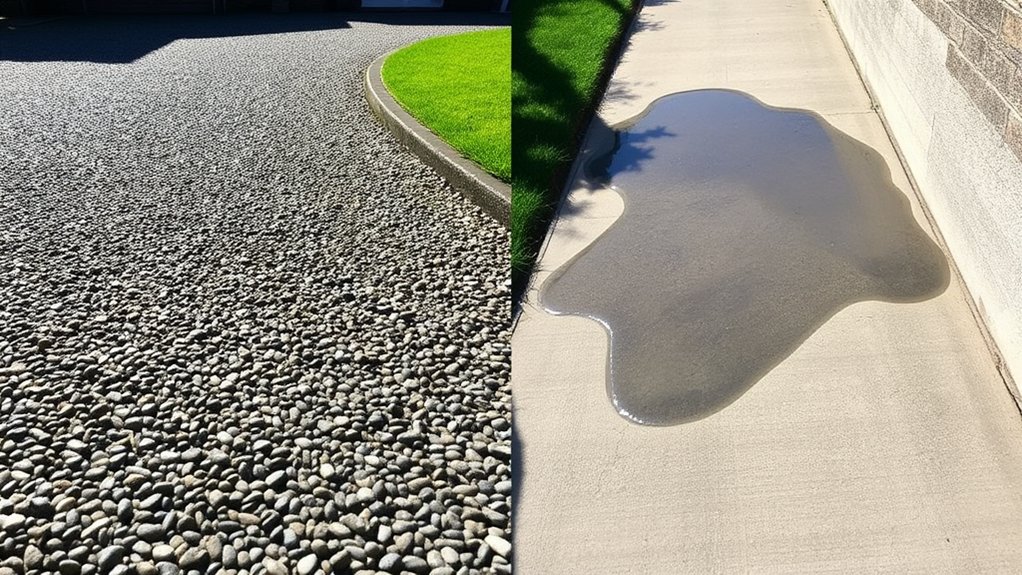
Resin bound gravel handles water drainage far better than standard paving options like concrete or tarmac.
The porous surface lets rainwater soak through naturally, rather than pooling or running off into drains. This makes it particularly useful for British gardens and driveways, where rainfall is frequent.
The system helps prevent localised flooding and reduces pressure on storm drains – a growing concern in many UK neighbourhoods.
It's worth noting that proper installation ensures the surface stays permeable for years to come, making it a practical choice for sustainable urban drainage.
Water Drainage Efficiency
Water drainage efficiency plays a vital role when choosing between resin-bound gravel and traditional paving options.
Resin-bound surfaces let rainwater seep through naturally, much like a garden lawn, which helps prevent puddles and flooding. Traditional materials such as concrete and tarmac create waterproof barriers that often need extra drainage systems – think of them like a sealed windowpane versus a sponge.
- Resin-bound surfaces meet UK SuDS regulations for sustainable drainage
- Good drainage means less upkeep and fewer slip hazards, particularly in wet weather
- Standard paving can worsen drainage problems in built-up areas, leading to localised flooding
- Proper water flow through resin-bound surfaces keeps them looking smart and lasting longer
The practical benefits are clear: whilst it's raining, resin-bound driveways stay safer to walk on, and you won't find yourself splashing through puddles like you might with concrete or tarmac surfaces.
Environmental Impact Comparison
Comparing resin-bound gravel to traditional paving shows clear differences in environmental impact, particularly for drainage.
Resin-bound surfaces let rainwater filter through naturally, much like a garden lawn, which helps prevent flooding and meets UK SUDS requirements. Think of it as a built-in drainage system that keeps water from pooling on your drive or patio.
Traditional materials like concrete and asphalt create waterproof barriers that force rainwater to run off into drains, often overwhelming local systems during heavy rainfall. We've all seen the resulting puddles and flooding that plague many UK neighbourhoods.
The manufacturing process matters too. Resin-bound gravel needs fewer raw materials and creates less waste than concrete or asphalt production.
It's a more sustainable choice that helps protect local streams and rivers from polluted surface runoff.
For British homeowners looking to make eco-friendly improvements, resin-bound surfaces offer practical benefits whilst supporting environmental goals.
Aesthetic Options and Appeal
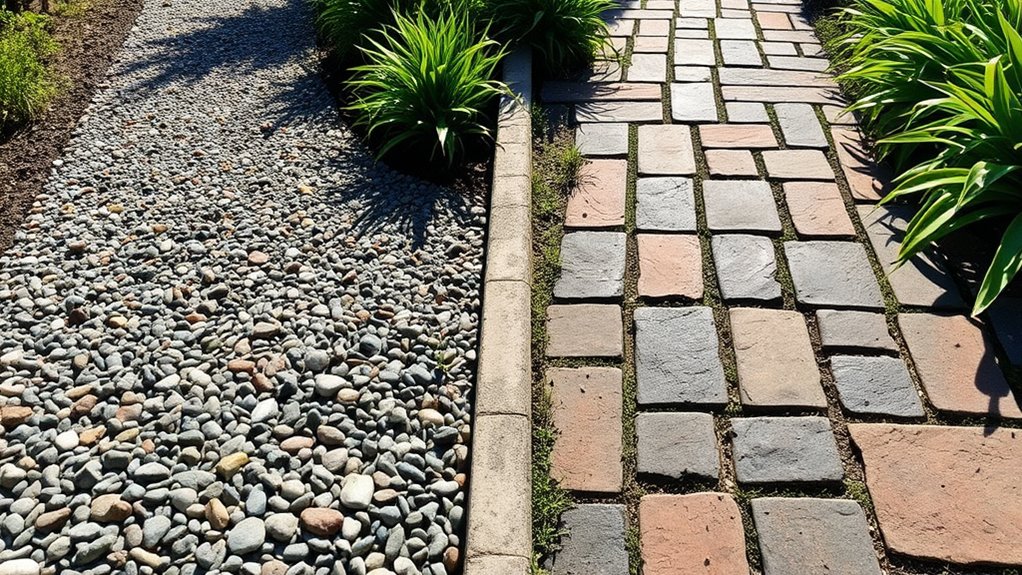
Resin-bound gravel stands out for its vast range of colours and style options, making it a brilliant choice for contemporary garden designs and driveways.
Think rich terracottas, warm greys, or even striking blues – the choice is yours.
Traditional block paving, whilst reliable and classically appealing, tends to stick to standard brick reds and greys.
If you're after a natural look that's both modern and customisable, resin-bound surfaces tick all the boxes, though classic paving still holds its own for those preferring a more conventional finish.
Customization and Color Variety
Resin-bound gravel delivers outstanding customisation options and colour choices, perfect for creating distinctive outdoor spaces. From driveways to garden paths, you can achieve precisely the look you want.
Notable features:
- Custom logo options – ideal for business premises or house numbers
- Wide colour selection, from subtle browns and greys to bold statement shades
- Bespoke colour blending to match existing property features
- Choice of aggregates, including marble and quartz for different finishes
This versatility lets you craft unique surfaces that complement your property, offering far more design freedom than standard block paving or concrete.
Whether you're after a classic Cotswold stone look or a contemporary metallic finish, resin-bound gravel adapts to your vision.
Natural Look Alternatives
Natural Look Options for Your Outdoor Space
The choice between traditional paving and resin-bound gravel significantly affects your property's outdoor appearance. Traditional stone paving offers timeless appeal but often creates visible joins and edges. Resin-bound surfaces blend natural stone aggregates for a smooth, continuous finish that looks both contemporary and natural.
| Aesthetic Feature | Traditional Paving | Resin-Bound Gravel |
|---|---|---|
| Visual Characteristics | Varied textures | Smooth, seamless finish |
| Natural Aesthetics | Classic stone look | Modern yet natural |
| Rustic Charm | Gravel's character | Enhanced by aggregates |
| Maintenance Needs | Higher due to weeds | Minimal, easy cleaning |
Each option has distinct visual benefits. Traditional paving suits period properties and country gardens, whilst resin-bound surfaces work brilliantly in modern settings. For practical maintenance, resin-bound surfaces need less upkeep – no more pulling weeds from between stones or replacing displaced gravel after heavy rain.
Timeless vs. Modern Aesthetics
Outdoor surfaces play a crucial role in your property's character – traditional paving and resin-bound gravel offer distinctly different looks.
Each option suits different home styles across the UK.
Traditional paving:
- Creates classic kerb appeal with natural stone or brick
- Works brilliantly with period properties and cottage gardens
- Allows for traditional patterns like herringbone or basket weave
Resin-bound gravel:
- Delivers a smooth, contemporary finish
- Perfect for modern homes and minimalist gardens
- Offers colour options to match current design trends
The choice often comes down to your home's style.
A Victorian terrace typically suits York stone paving, whilst a new-build might better match the clean lines of resin-bound surfaces.
Both materials are popular across British gardens and driveways, each bringing their own charm to the space.
Think about your property's era and surrounding neighbourhood when deciding – the right choice will enhance your home's natural character rather than clash with it.
Cost and Sustainability
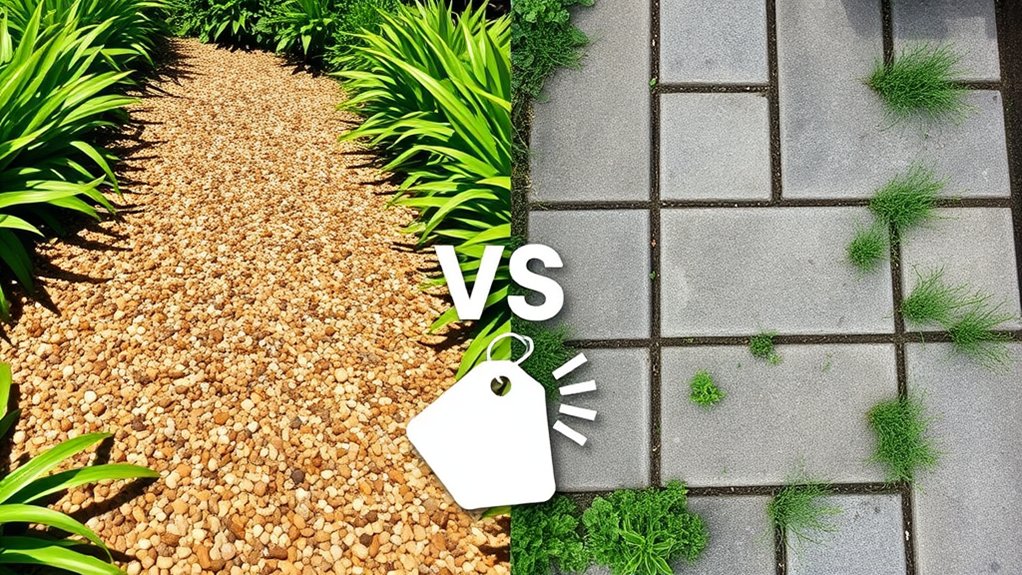
Resin-bound gravel stands as a cost-effective paving choice, typically costing £80-£130 per square metre in the UK. The system proves particularly economical when laid over existing surfaces, cutting down on groundwork costs.
By using local stone aggregates, you'll reduce both transport costs and environmental impact.
Whilst the material itself isn't recyclable, its long lifespan means you won't need frequent replacements. Compare this to traditional paving, which often requires more upkeep and creates significant waste during installation.
The result? Lower maintenance costs and a smaller environmental footprint over time.
The combination of reasonable upfront costs, minimal maintenance and sustainable practices makes resin-bound gravel a practical choice for UK property owners looking to balance budget with environmental responsibility.
Environmental Impact
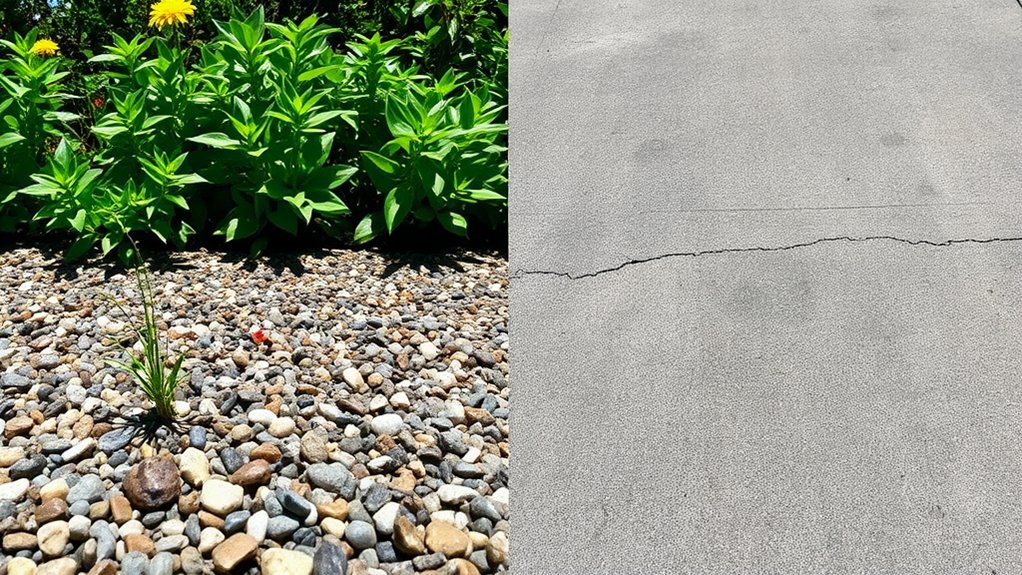
Environmental Impact of Resin-Bound Gravel
Resin-bound gravel stands out as an eco-friendly paving choice, mainly because it lets water drain naturally through the surface. This permeable solution helps protect local wildlife and prevents water pollution, making it ideal for British weather conditions.
Key benefits:
- Prevents puddles and flooding by allowing rainwater to soak through
- Meets UK SUDS requirements for sustainable drainage
- Contains recycled materials, cutting down on waste
- Keeps surfaces cooler than concrete or tarmac
Unlike traditional paving like concrete slabs or tarmac, which create water run-off and require extensive manufacturing, resin-bound gravel works with nature rather than against it.
It's particularly useful in British gardens and driveways, where rainfall management is crucial for preventing localised flooding and protecting groundwater supplies.
Conclusion
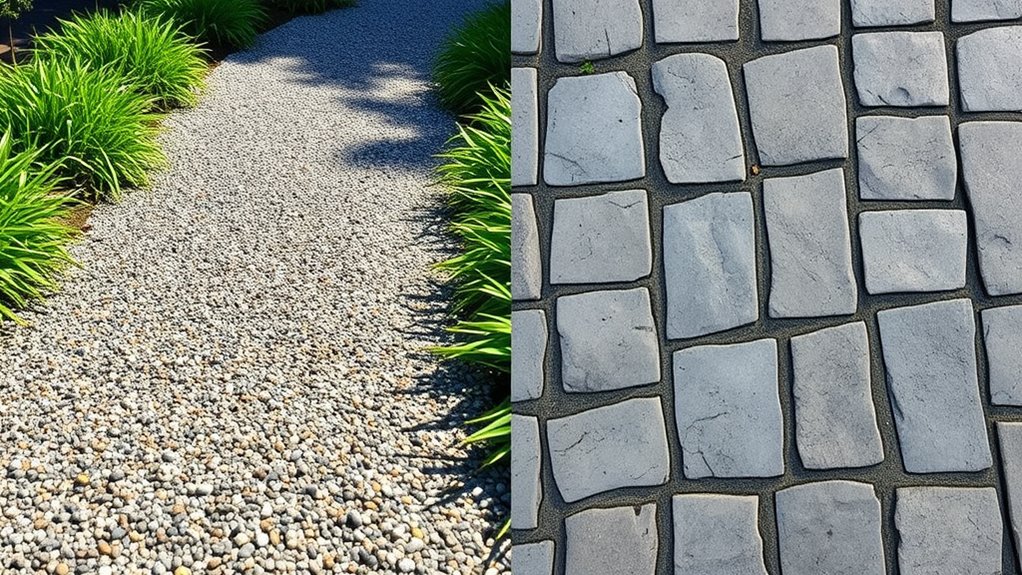
Resin-bound gravel stands out as a modern paving choice with clear environmental benefits, though choosing between this and traditional paving depends on your specific needs.
The initial cost may be higher, but its durability and minimal upkeep make it a sound long-term investment. Think of it like choosing between carpet and hardwood flooring – there's more upfront cost, but less hassle down the line.
The smooth, uniform finish works particularly well in contemporary British gardens and driveways, while requiring far less maintenance than typical block paving or gravel.
Traditional options, whilst offering that classic look, often need regular weeding and can become uneven over time – a familiar headache for many UK homeowners.
Your choice should reflect what matters most: upfront costs, ongoing maintenance, or kerb appeal.
A terraced house in Manchester might benefit from resin-bound's low-maintenance properties, whilst a cottage in the Cotswolds might suit traditional paving better.
Consider your property's style, budget and how much time you're willing to spend on upkeep before deciding.
Frequently Asked Questions
Can I Install Resin-Bound Gravel Myself?
DIY resin-bound gravel installation is possible, though it requires careful planning and proper tools. Whilst you might save on labour costs, factor in specialist equipment and materials before committing. Most DIY shops and builders' merchants stock the essentials, but you'll need items like a forced action mixer and suitable trowels. Think carefully about whether tackling it yourself makes financial sense – hiring equipment can quickly add up to the cost of professional installation.
How Does Resin-Bound Gravel Perform in Cold Climates?
Resin-bound gravel holds up remarkably well in cold weather. Its robust freeze-thaw resistance means it won't crack or break during British winters, and its flexible nature helps it cope with temperature changes. The surface remains stable and intact even during harsh frost conditions.
Is Resin-Bound Gravel Suitable for Driveways?
Resin-bound gravel makes an excellent choice for UK driveways, combining smart looks with lasting performance. Think of it as a premium alternative to standard gravel or concrete – whilst it costs more upfront than traditional surfaces, it won't scatter like loose gravel or crack like concrete. Just ensure you've got a proper foundation laid first, as this system needs a solid base to work properly.
What Is the Average Lifespan of Traditional Paving?
Traditional paving typically lasts between 20 to 100 years, depending on installation quality and maintenance. Much like a well-maintained motorway, proper materials and regular upkeep ensure the longest possible service life. Regular inspections and repairs of any cracks or damage help maximise its durability.
Can Resin-Bound Gravel Be Recycled?
Resin-bound gravel cannot be recycled in the traditional sense due to its mixed composition. Whilst this might seem a drawback, its impressive lifespan of 15-20 years means fewer replacements are needed compared to loose gravel or concrete. To boost sustainability, many UK suppliers now offer mixes containing recycled glass and stone aggregates, though the resin binding agent remains non-recyclable.
Conclusion
Resin-bound gravel and traditional paving each offer unique benefits for UK homeowners. Whilst resin-bound surfaces cost more upfront, they require virtually no maintenance and resist cracking, even in harsh British weather. Traditional paving, like block paving or concrete, remains a tried-and-tested choice that's easier on the wallet.
Think of it this way: resin-bound is like investing in a quality winter coat – pricier initially but serves you well for years. Traditional paving is more like a standard jacket – reliable, cost-effective, but might need occasional repairs.
Your choice should match your practical needs. For driveways that see heavy use, resin-bound's durability shines. For simple garden paths, traditional paving might do the job perfectly well. Both can boost your property's kerb appeal – it's about picking what works for your budget and lifestyle.
